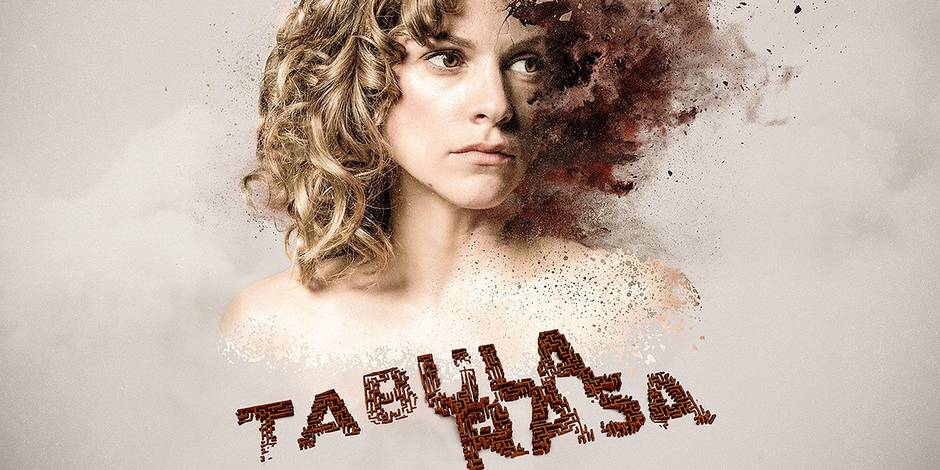
Tabula Rasa – Episode 3: Bird for the Cat
 Starring: Veerle Baetens, Stijn Van Opstal, Gene Bervoets, Hilde Van Mieghem, Cécile Enthoven, Jeroen Perceval
Starring: Veerle Baetens, Stijn Van Opstal, Gene Bervoets, Hilde Van Mieghem, Cécile Enthoven, Jeroen Perceval
Director: Kaat Beels, Jonas Govaerts
Writers: Veerle Baetens
Reviewed by Sidney Morgan
This review CONTAINS MINOR SPOILERS.
After two fairly intense episodes, Bird for the Cat had a far more relaxing atmosphere. The flashbacks in this episode are mostly about Mie and Thomas spending some time together. Even though Mie continues to deny knowing him in the present, it’s become clear to the viewer that nothing could be further from the truth. But what did happen between those two? Why is she now the prime suspect in his disappearance? Mie smiles when she’s with him. Heck, she even flirtatiously admits to her sister that she enjoys being with him. Is he taking advantage of her situation? And, where does this leave Benoit, her husband?

Though he shows care and concern for Mie, Benoit still acts suspiciously. There’s a clear struggle between the two. Concerned that she may experience memory loss while out, he monitors and questions her. However, Mie is suspicious of him. She’s just not sure why. To help her remember, she makes a note of his controlling behaviour in her phone. But, as he did with the post-its notes in the previous episode, he takes her phone and deletes it. Conveniently enough, given her condition, she doesn’t remember.
While going through her phone, Benoit sees the reminder Mie set to meet Thomas at the recycling center. He questions her about it and is suspicious of her answer, but he doesn’t delete it. Knowing something will happen to Thomas and how Mie is being misled by Benoit, it’s satisfyingly frustrating to follow the story at the director’s imposed pace. It’s like watching someone carefully unwrap a gift, without damaging the paper. You just want to tear it for them!

Meanwhile, back in the present, inspector Wolkers isn’t making any progress with Mie. However, he suspects she’s withholding some information because occasionally she hesitates prior to answering his questions. With his upcoming retirement, it’s important to him to leave on a good note, which means solving this case. Trying for a more aggressive memory jog, he decides to take her to a cabin where she and Thomas were last seen together. Seeing it through Mie’s eyes and memories gave us a few more clues, but boy oh boy, that ending! I was literally yelling at the television, hoping that Mie and Wolkers would somehow hear me.
The slower tempo of this episode gave me the opportunity to think about the puzzle that is this show. I was surprised that this was only the third episode of nine (ohhh, can’t wait for the seventh….). The story is complex and layered. Going back and forth between the present and the past, while trying to fill in the gaps with Mie’s unreliable memories makes Tabula Rasa a fascinating show. It’s a true testament of the quality of the writing. Having said that, here are a few thoughts.

Curiously, Mie’s father suffers from Alzheimer’s, another medical condition that attacks memory. It can’t be coincidence that two characters suffer from memory issues, can it? Is this the director’s or writer’s indictment on the fragility of memory, or its unreliability? Then there’s the title, Tabula Rasa, which translates to clean slate, a direct reference to Mie’s issue. Recall that every time she experiences stress, she forgets, essentially starting anew. A clean slate. Additionally, tabula rasa can also mean an absence of preconceived ideas, and Mie is the only one without them, even if through no fault of her own. Given we experience the story through her eyes and her thoughts, our slate is as blank as hers, except that in our case, we don’t forget. And as of the first episode, we don’t have any preconceived ideas either. An intriguing title, isn’t it?
There is also something strange going on with the color red. Romy, Mie’s daughter, often wears something red, like Little Red Riding Hood. In Perrault and Grimms’ versions, she’s eaten by a wolf. Though I doubt this literally happened in Tabula Rasa, could it portend that something bad will happen (or has happened) to Romy? And her bedroom windows are red at night. When there are no other bright colors in a show, except for the red, it’s more than coincidence, right? Remember how it was used to signal clues in The Sixth Sense? Or in Twin Peaks, with the evil black lodge lined with red curtains? Of course this is all pure speculation, but it did make me wonder.
Verdict: Continue to watch
After two intense episodes, this one offered a welcomed respite. Don’t be fooled! With the reveal at the end of the episode, there can be no doubt the intensity will return. Is Thomas alive? Dead? And is Mie responsible or just a pawn in a darker game? Tune in and watch!

![[REVIEW] COSMIC CADETS: CONTACT!](https://geekd-out.com/wp-content/uploads/2023/04/F66EF914-A39D-48BA-85B9-C04C8C6FD97A-150x150.jpeg)

